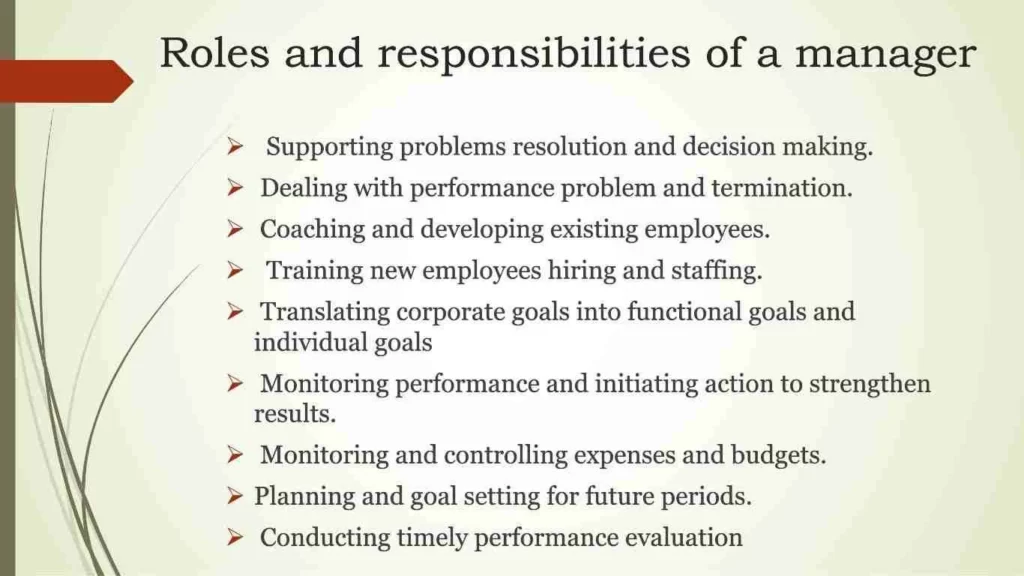Table of Contents:-
- Responsibilities of a Manager
- Skills of a Manager
- Strategic Tips for New Managers
- Roles and responsibilities of a manager
There are no fundamental distinctions between managers, executives, administrators, and supervisors. However, it is important to note that the responsibilities and duties of a particular role can differ significantly depending on the level of the organization or the type of business. The responsibilities of a manager are multifaceted and crucial for the success of an organization. Additionally, the extent of the authority held and the challenges faced can vary greatly.
Responsibilities of a Manager
The role of a manager encompasses a wide range of responsibilities and duties. These include but are not limited to the following:
- Leading and motivating a team to achieve organizational goals and objectives.
- Developing and implementing strategies to improve productivity and efficiency.
- Managing budgets and resources effectively.
- Ensuring compliance with company policies and regulations.
- Recruiting, training, and evaluating employees.
- Communicating effectively with team members, stakeholders, and clients.
- Resolving conflicts and addressing performance issues.
- Continuously monitor and evaluate performance to identify areas for improvement.
- Making informed decisions related to data and analysis.
- Maintaining a positive and professional work environment.
As a manager, having strong leadership skills, effective communication abilities, and a strategic mindset is important. By fulfilling these responsibilities and duties, a manager can drive success and growth for the organization.
1. Daily Operations
The main duty of a manager is to supervise the daily operations of a department or a team of employees. This involves ensuring that tasks are executed efficiently and effectively while maintaining a professional approach.
2. Staffing
Top management highly values their managers’ exceptional skills in recruiting, hiring, and training new employees.
3. Set Goals
A manager strategically sets both short-term and long-term objectives to ensure the sustained success and growth of the company.
4. Liaison
A manager’s role involves overseeing a group of employees. They also play an important role in facilitating effective communication between their team and boss, and they pass the necessary information to various company parties.
Related Article:- Factors Affecting Recruitment
5. Administration
Managers are responsible for performing various administrative tasks and communicating with other departments. This includes managing budgets, overseeing the organization’s day-to-day operations, and ensuring that all policies and procedures are followed properly.
6. Delegation
Delegation of authority requires confidence and the ability to assign tasks based on the needs of both employees and the department. By delegating responsibilities among the team members, managers can empower their team members to take ownership of their work and develop their skills.
7. Motivate
As a leader, a skilled manager knows how to inspire and encourage their team to achieve their best and create an environment where employees thrive.
8. Enforcement Policy
Managers are responsible for enforcing company policies in a work environment that encourages accountability among employees for their actions.
9. Training
When new technologies or systems are introduced to a business, managers play an important role in training employees.
10. Evaluation
Managers assess accurate information, data, figures, and employee performance to encourage good work.
Skills of a Manager
The skills and roles of a manager in an organizational hierarchy are as follows:
The following are the managerial skills:
(i) Technical Skills
Technical skill is the knowledge and proficiency in activities, processes, methods, and procedures. Thus, it involves working with tools and special techniques. For example, mechanics work with agencies, and their bosses should be able to teach them how to use these tools. Similarly, accountants apply exclusive techniques in doing their tasks.
(ii) Human Resource Skills
It is the ability to work with people, cooperative effort, and teamwork. It creates an atmosphere where people feel safe and can freely express their opinions.
(iii) Conceptual Skills
It is the ability to see the ‘big picture’ to recognize the important elements in a situation and understand their relationships.
(iv) Designing Skills
The ability to solve problems in such a way will benefit the company. To be effective, especially at top organizational levels, managers must be able to do more than look at a problem. They should, moreover, have the skills of a good design engineer to work out a practical solution to a problem.
To be a successful business manager, think of sharpening the following skills:
1. Coaching
Managers coach and develop employees to help them perform their work more efficiently in the business world.
2. Organization
Although departments vary in size, managers are responsible for the performance of other employees and departments, which means that managers maintain an organized work environment.
3. Budget development
Many managers need to pay more attention to business finances, which means managers have budget-making skills.
4. Handling Pressure
The business world is often competitive and involves high pressure, so an effective manager handles that pressure and thrives in a high-stakes business environment.
5. Adaptation
The business sector is constantly changing, and managers are adapting to alternative technologies, management structures, and forms of communication.
6. Initiative
Managers don’t always wait for their superiors to give directions. Instead, they take the initiative and start projects when necessary.
7. Collaboration
The best ideas are often created during collaborative efforts, so managers take the time to work with their employees, other managers, and superiors.
8. Project Management
To ensure success, managers supervise each project phase and intervene when required.
Strategic Tips for New Managers
The following strategic tips can help new managers adapt to their work environment:
1. Develop an ethos
A manager must establish and maintain the desired professional ethos in the new workplace.
2. Confidence
Starting a job with confidence provides a manager with the necessary authority to manage a new set of employees.
3. Interpersonal Relationships
To gain the employees’ trust, managers try to develop interpersonal relationships.
4. Stress Management
Starting a new position is difficult, so managers must practice stress management.
5. Transition Gradually
Instead of drastic changes in the management system once hired, a smart manager observes the work environment and gradually changes to the desired management style.
Roles and responsibilities of a manager

The roles and responsibilities of a manager are explained as follows :
- Dealing with performance problems and termination.
- Coaching and developing existing employees.
- Training new employees.
- Translating corporate goals into functional goals and individual goals.
- Monitoring performance and initiating action to strengthen results.
- Monitoring and controlling expenses and budgets.
- Planning and goal setting for future periods.
- Conducting timely performance evaluations.
- Supporting problem resolution and decision making.
- Hiring and Staffing.

- Product designing.
- Purchasing equipment for production.
- Planning the geographical location of the organization.
- The layout of equipment within an organization.
- Capacity planning.
- To maintain contact with the outside world.
- To provide safety and security to consumers’ trust in the organization.
- To find new and creative solutions to the problems faced by an organization.
- To motivate and inspire employees to work towards the goal of an organization.
- Supporting problem resolution and decision making.
- To ensure effective and proper utilization of resources to reduce wastage.
- Production planning and scheduling.
- To provide a legal, safe and secure work environment.

You May Also Like :-
Methods of Management Development
Workers Participation in Management
Nature of organisational behaviour
Features of Management Development
Human Resource Development Mechanisms
Process of Human Resource Planning
360 Degree Performance Appraisal
Limitations of Human Resource Planning
